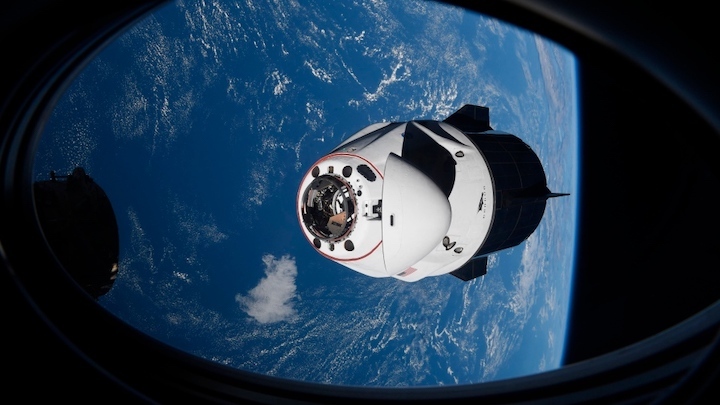26.12.2021

In this Saturday, April 24, 2021 photo made available by NASA, the SpaceX Crew Dragon capsule approaches the International Space Station for docking.
MONTREAL -- The rapid development of space tourism and the planning of long missions to the Moon or Mars mean that humans will sooner or later have sex in space, and it is important to start thinking about how this sexuality will be experienced, argues a Montreal researcher.
NASA asserts that no sexual relations have ever taken place in space — but it’s only a matter of time before this happens, believes Concordia doctoral student Simon Dubé.
“As we continue to expand into space, as we go on longer and longer missions, either in orbit, or to the Moon, or to Mars or elsewhere eventually, we obviously have to confront all the complex bio-psycho-social issues related to sexuality, and then human intimacy," said Dubé.
A wealthy couple who takes a trip to space might decide to join the “62-mile-high club” (the ultra-exclusive club of those who have been intimate in orbit, at an altitude of 100 kilometers, compared to the “mile-high club” of those who have done the deed on an airplane). Astronauts trapped aboard a spacecraft for several months could end up giving in to temptation.
So far, studies conducted on the subject show that sexual and romantic relationships will eventually develop between space explorers, Dubé and his colleagues write in the Journal of Sex Research. They argue that banning such relationships or imposing sexual abstinence on astronauts is not a viable option.
Healthy sexuality is an essential component of human physical, psychological and emotional health, the study authors say. The crew of a spacecraft or members of a permanent mission to the Moon or Mars, on the other hand, will have limited access to compatible sexual or romantic partners, and this can be a source of stress and conflict.
It’s easy to imagine a situation that might arise if two crew members develop a relationship that ends badly — or if one crew member refuses the advances of another. And who would dare — in a situation where collaboration is essential and each is dependent on the other— to refuse a rapprochement with the person in charge of medical care, for example?
Thousands of kilometers from Earth, it is simply not possible to get out of an uncomfortable or dangerous situation by taking a cab home.
The likelihood of such risks emerging likely increases with the amount of time people spend in space and their distance from Earth resources, the authors argue.
“Imagine if it happens in contexts where you’re on a long-duration mission, and for several months or even years, with a relatively small crew. You can’t run away. What are the solutions?" asked Dubé.
JUDITH LAPIERRE
The article’s authors cite Quebec scientist Judith Lapierre as an example, who participated in a European space mission simulation at the turn of the millennium. She is also the co-author of the new article.
Now a researcher at Laval University, Lapierre was locked in a train-car sized chamber (which replicated the defunct Mir space station) with a few men for 110 days. She recounted being grabbed and forcibly kissed by the Russian mission leader, to the point where she felt the need to start sleeping with a knife under her pillow.
She was also allegedly subjected to a sexist discussion in which she was objectified by other participants.
“These deplorable events highlight the likelihood of sexual harassment and violence” on a space mission, the authors write.
The experiences of some members of the armed forces during long overseas deployments can also serve as a point of comparison for what lies ahead for space explorers. In Canada, for example, the military has been plagued by a succession of sex scandals for more than a year.
BETTER UNDERSTANDING
To contain the risks and harness the benefits of sex in space, it is important to first understand them better, the authors argue.
“We really need to take a proactive approach, and then start studying [the subject] to develop training, courses, preparations, for people who are going to live in space for long periods of time, to prepare them for that reality," Dubé said.
“We need to address sexuality in space before space travel becomes even more prevalent and unfortunate events occur," he added.
Intimacy and sexuality — like entertainment — could help normalize life in space by making it more enjoyable and less lonely, the authors write.
“[Sexuality can] have benefits for cardiovascular health, for psychological well-being,” Dubé said. “It can help you sleep, it can help you relax. It can also help normalize life in space. It can help people adapt to contexts that are very stressful and demanding, that is, living and working in a restricted environment.”
The authors propose that technology could be used to satisfy astronauts’ sexual needs, much as participants in long-duration scientific or military missions might have pornography or sex toys in their possession.
And if humans aspire to permanently colonize other worlds, we will need to better understand how they will then be able to reproduce, since procreation in space would come with multiple challenges such as weightlessness and radiation exposure. Experiments conducted on mice have shown, for example, that microgravity can interfere with sperm motility and embryo development.
In the event of a slip-up, the authors warn in conclusion, the space agencies, whether public or private, will not be able to plead ignorance since studies on related subjects have been carried out for some thirty years. They could therefore one day be held accountable for the health and safety of those they send to the stars.
“If we don’t study and plan for these issues, there can be a lot of problems that will arise.”
